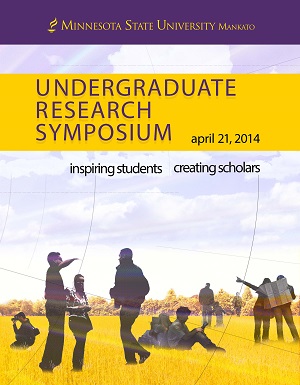Location
CSU 253
Start Date
21-4-2014 11:05 AM
End Date
21-4-2014 12:05 PM
Student's Major
Psychology
Student's College
Science, Engineering and Technology
Mentor's Name
Dawn Albertson
Mentor's Email Address
dawn.albertson@mnsu.edu
Mentor's Department
Psychology
Mentor's College
Science, Engineering and Technology
Description
This year, the worldwide web celebrates twenty-five years of existence. Its popularity has grown tremendously and we now see a majority of the population utilizing the Internet’s various outlets to achieve greater amounts of knowledge in lesser amounts of time. The broad spectrum of media sources enables a greater access of information to all people, increasingly impacting their level of science knowledge. The current study looked to explore the relationship between level of science knowledge, preferred media source and frequency of exposure. One hundred thirty-five participants were surveyed. Questions from the Pew Research Center’s “Science and Technology Knowledge Quiz” were utilized as well as additional questions covering multiple aspects of science ranging from genetics and medical research to literacy and degree of trust in various sources. Participants’ science knowledge will be compared to the national averages, as reported by Pew, and organized into high, medium and low knowledge groups. Groups will further be assessed for differences on knowledge confidence, preferred media source, and frequency of science media exposure. Similarities and differences between local and national populations, as well as differences amongst science knowledge groups, will be discussed.
Creative Commons License

This work is licensed under a Creative Commons Attribution 4.0 International License.
Included in
Communication Technology and New Media Commons, Science and Mathematics Education Commons
Media Impact on Science Knowledge
CSU 253
This year, the worldwide web celebrates twenty-five years of existence. Its popularity has grown tremendously and we now see a majority of the population utilizing the Internet’s various outlets to achieve greater amounts of knowledge in lesser amounts of time. The broad spectrum of media sources enables a greater access of information to all people, increasingly impacting their level of science knowledge. The current study looked to explore the relationship between level of science knowledge, preferred media source and frequency of exposure. One hundred thirty-five participants were surveyed. Questions from the Pew Research Center’s “Science and Technology Knowledge Quiz” were utilized as well as additional questions covering multiple aspects of science ranging from genetics and medical research to literacy and degree of trust in various sources. Participants’ science knowledge will be compared to the national averages, as reported by Pew, and organized into high, medium and low knowledge groups. Groups will further be assessed for differences on knowledge confidence, preferred media source, and frequency of science media exposure. Similarities and differences between local and national populations, as well as differences amongst science knowledge groups, will be discussed.
Recommended Citation
Richardson, Joanna. "Media Impact on Science Knowledge." Undergraduate Research Symposium, Mankato, MN, April 21, 2014.
https://cornerstone.lib.mnsu.edu/urs/2014/oral_session_06/1




